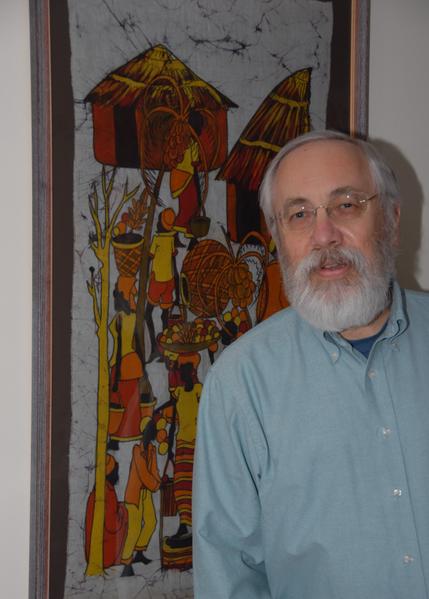
“It’s an experience that I would recommend for anyone and everyone because it really gave me a sense of how good we have it here in the states.” He tells people who are interested in joining the corps that the first cut is the paperwork. “You have to be persistent enough to fill out the forms.” In addition to that, Ivas had to get his wisdom teeth removed and prove that a pesky critter that he’s allergic to, a wasp, did not inhabit that region in Africa. Then there were the shots and an intensive 2-1/2 months of hands on training leading up to his departure. The training was held at a former Air Force base in Oklahoma, at which volunteers learned about fish culture and how to be self-reliant when it comes to finding things. The first day, the instructor told the students that he would meet them at the ponds at noon, but he didn’t tell them where the ponds were – so the students had to find them themselves. After returning to the classroom, he asked them questions they did not know the answer to, requiring them to walk a mile in 95 degree heat to get the answer. After two such treks, the students took notes to avoid another venture. Ivas said the instructor told his class that it was the only one up until that point that had found the ponds on the first day. “It was probably the most intensive, but the best training I’ve ever had,” Ivas said. “It was sort of like Marine training as well. We were given so much work. We had about three hours of sleep a night.”
Steve Ivas went to the Peace Corps office in Boston to check out other programs and applied for one on fish culture in the former country of Zaire, now the Democratic Republic of the Congo
The toughest job Steve ever loved: A Peace Corps presentation
By Tessa Fitzgerald
Fri Mar 07, 2008, 01:33 PM EST
Norwell -
Steve Ivas never planned to join the Peace Corps.
Then, at the age of 27, he was working as a research scientist at GTE Labs. He was at a function at the Smithsonian just after the Blizzard of 1978. He said the museum had a contract with the Peace Corps to do research work and there was talk of a project involving river otters on the Amazon.
Ivas said he was not happy with his job, partly because the company had just changed the project research threshold from 15 years to 5 years.
He was interested in the river otter project and went to find out more the next day. A month later he got a call telling him the funding for that program had been lost. He went to the Peace Corps office in Boston to check out other programs and applied for one on fish culture in the former country of Zaire, now the Democratic Republic of the Congo, in Africa.
“I didn’t know a thing about fish culture and I didn’t know anything about where Zaire was,” Ivas said.
Sixty-five forms later, Ivas was one of 15 people selected for the program in 1979.
“It was a relatively quick decision on my part,” Ivas said. “My family and friends thought I had gone off the deep end. They thought I had just lost it completely. Come to find out this was one of the most rewarding things I have done in my life.”
Ivas, who has now traveled to 55 countries, talked about his experience at a presentation at the Norwell Public Library last Thursday (Feb. 28),
because it was national Peace Corps week – a time during which past volunteers spread the word about their experiences and the organization. The Peace Corps was founded on March 1, 1961 by former president John F. Kennedy. Today, 190,000 people have volunteered in 139 countries, according to the organization. Currently there are 68 posts in 74 countries.
Though the average age of a volunteer is now 27, the organization’s oldest volunteer is 80.
Ivas, who has been doing presentations for six to seven years, began last week’s series of presentations by talking to his son’s class at Norwell High School.
During his time in Africa, Ivasmoved around a bit between Kinshasa and the Mbuji-Mayi (translates as goat water) areas, as well as some time near the Great Rift Valley and at Ngandajika.
He still dreams of being in Africa and said he’s learned so much about the world from his experience. “I see our culture differently than I did before I went,” Ivas said. “It was like a two-year retreat for me.
“It’s an experience that I would recommend for anyone and everyone because it really gave me a sense of how good we have it here in the states.”
He tells people who are interested in joining the corps that the first cut is the paperwork. “You have to be persistent enough to fill out the forms.”
In addition to that, Ivas had to get his wisdom teeth removed and prove that a pesky critter that he’s allergic to, a wasp, did not inhabit that region in Africa. Then there were the shots and an intensive 2-1/2 months of hands on training leading up to his departure.
The training was held at a former Air Force base in Oklahoma, at which volunteers learned about fish culture and how to be self-reliant when it comes to finding things. The first day, the instructor told the students that he would meet them at the ponds at noon, but he didn’t tell them where the ponds were – so the students had to find them themselves.
After returning to the classroom, he asked them questions they did not know the answer to, requiring them to walk a mile in 95 degree heat to get the answer. After two such treks, the students took notes to avoid another venture.
Ivas said the instructor told his class that it was the only one up until that point that had found the ponds on the first day. “It was probably the most intensive, but the best training I’ve ever had,” Ivas said. “It was sort of like Marine training as well. We were given so much work. We had about three hours of sleep a night.”
Ivas was allowed to bring 187-pounds of items with him when he left for his 27-month deployment. While he filled most of his luggage with tools he would need for the journey, he did bring along a few splurge items including a quart of Breck shampoo, a camera, film and YSL sheets.
He said he was easily able to prove that he was not an economic spy for the United States when questioned by those suspicious of him. He just showed them his holey, re-seamed trousers and worn shoes. Most natives, however, knew about the Peace Corps and why the volunteers were there, so he was treated well by the locals.
One of the first orders of business once he arrived was learning the languages of the locals. In an immersion technique, Ivas was taught French and Lingala – which was the trade language of the country. He spent two months learning the languages, but before that he was sent out into the bush to interact with the locals who did not speak English. The frustration of the language barrier motivated the volunteers to learn the local language, Ivas said.
Though Ivas was heading to a Third World country, his biggest fear was not of the ability to communicate, wild animals or diseases.
“My biggest fear was what was I going to eat,” Ivas said.
There was the rare can of tuna fish or Spam he’d find at a market, or the time he was an honored guest and ate bugs, but generally Ivas’ diet during his stay consisted of rice and beans. He employed a local person to prepare his meals and do his laundry – tasks which took all day.
The strangest things Ivas said he consumed were alligator and field rat.
Male Peace Corps volunteers, he added, tended to lose weight, while the women tended to gain weight.
He recalled being in a state of shock the first time he went into a grocery store after coming back to the United States, thinking how many people the food could feed and how many choices there were. “I still feel guilty when I go out to eat,” he said.
His weekends were spent talking with locals or other volunteers, sometimes over a few beers.
His biggest challenge when it came to teaching locals about fish culture was teaching them to think about the future. Life there was very day-to-day and people lived every minute of it, Ivas said.
Ivas said they built the ponds for tilapia fish using shovels and one wheel barrel. Most of the soil they were moving was placed on weaved mats and dragged away. They also put a canal on the side of a hill.
During a recent Google search, Ivas was able to find where he was stationed on maps and he could still see the ponds he helped build.
“The most rewarding part was actually getting to see the people actually build the ponds and grow up the fish and well on their way to self sufficiency.”
His wife Jeanne – his girlfriend at the time - was able to visit him in Africa for six weeks. He said she’s been very supportive of his ventures over the years.
Ivas, who said he’s never had trouble in a small village, offered some travel advice for those who want to venture out into the world: separate the people from the politic.
For more information on the Peace Corps, check out the organization’s Web site, www.peacecorps.gov.
Cultural tidbits
During his tenure in Africa, Steve Ivas learned a lot about the local culture. Here are some of his unique experiences.
He fashioned a shower with a pipe hooked up to moving water that seeped out of the side of a hill.
Many villagers in the central region where he stayed practiced dancing. Others in the northern region prayed. Everyone was extremely social.
He said he found that people in the villages are accepted for who they are and taken care of.
The focus in Africa more on families, he found. Ivas said when you meet someone in America, they usually ask you what you do for a living. But in Africa, people asked about and talked of their families.
He wasn’t used to the handholding, though.
“It was normal for a man to walk down the street holding another man’s hand,” Ivas said. “Holding hands was really a new experience for me.”








